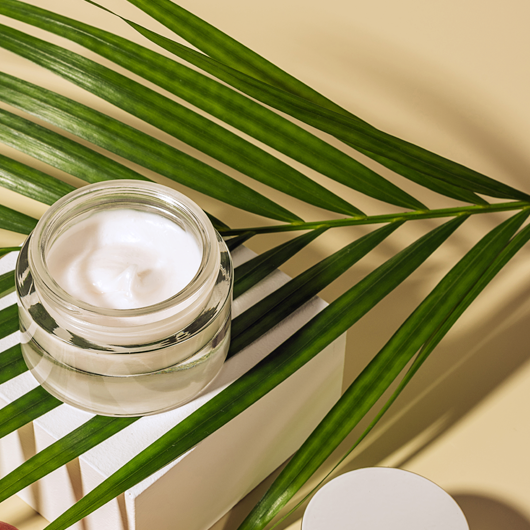The ingredients on this list are common in cosmetics and skincare. Here is our list of the top ten toxins to avoid in your skincare products. They are cosmetic ingredients that are known to be or suspected to cause irritation or other health problems. Remember to read your labels and see what you are putting on your skin!

- Parabens Methyl parabens, Propyl parabens, Butyl parabens, Iso parabens, and Ethyl parabens - The parabens are used in cosmetics as a preservative to inhibit microbe growth. Some scientific research has linked them to breast cancer. The biggest issue most people have with them is that they can cause skin irritation and allergic reactions.
- Sulfates aka SLES, SLS, ALS, Sodium Lauryl Sulphate, Sodium Laureth Sulphate - These nasty little guys make soap foam and cause all sorts of skin irritations. Sulfates can wreak havoc on our Central Nervous System.
- Mineral Oil - Mineral Oil is a petroleum bi-product. It is used in cosmetics and skincare because it is very, very inexpensive. It acts like plastic on top of the skin to hold moisture in. What it does is clog pores, which can cause acne. Mineral Oil does not allow the body to eliminate toxins.
- 1, 4 Dioxane - 1, 4 Dioxane is a solvent used in cosmetics and shampoos. It can cause liver and kidney damage. 1, 4 Dioxane has been shown to cause cancer in rats.
- PVP Acrylates Carbomer - Petroleum chemical that is used in cosmetics and hairspray. It penetrates the lungs, which can cause infections.
- Formaldehyde Donors - Formaldehyde is cancer-causing; it is a known carcinogen. Besides irritating the skin, it can cause headaches and fatigue. Many cosmetics may contain ingredients that also contain formaldehyde in them, such as Urea or some synthetic preservatives.
- Phthalate - These are used in plastics. Plastics such as plastic wrap and plastic food containers may contain phthalates. Phthalates are absorbed in the body and disrupt regular hormone activity. They can also be found in hairspray and nail polish.
- Synthetic Dyes & Colors - Colors that make your cosmetics beautiful (yes, FD & C colors) are made from coal tar. Coal tar contains heavy metal salts that, over time, leave toxins in our skin, which may lead to irritation.
- Synthetic Fragrance - Fragrances can be filled with thousands of separate ingredients, many of which may be toxic. Most companies will not tell you the ingredients that are used in perfume. They can lead to headaches and skin irritation. They can also lead to hyperactivity in children. To be safe, use essential oils or choose a product with no scent at all.
- BHT or Butylated hydroxytoluen - They are used in many packages, such as cereal, as a food preservative. BHT is also used in cosmetics and has carcinogenic properties, but because it is only in small amounts (.01% to .1%), it is said not to pose a cancer risk.
It's easy to assume that all of the store shelves packed with skin cleansers, toners, scrubs, and lotions. These products are a haven for those seeking bright, healthy skin and youthful beauty. Unfortunately, many of these products contain ingredients that can irritate the skin by causing allergic reactions like rashes and redness.
Some elements can even trigger respiratory problems, which can be a severe health problem for susceptible individuals.
Back to Basics
With all of the chemicals and toxins in many of today's beauty products, it's no wonder people are turning to nature. More and more often, to find the best organic skincare options available. Here at Skin Perfection, our focus is on natural skincare that not only boosts skin health and enhances beauty but does it without irritating, artificial ingredients.
Common Culprits
With ingredient lists a mile long, many of them trying even to pronounce, which are the worst offenders, and what symptoms can they cause? Here are several of the components most frequently found in skincare products, along with the potential problems they present.Sodium Lauryl Sulfate (SLS): This foaming agent is found in a wide range of beauty products, including soaps, shampoos, even toothpaste. SLS may cause eye irritation, rashes, and – ironically – actually dry skin and hair out.
According to the Environmental Working Group, an organization monitors and certifies skincare products according to strict ingredient standards. There is also a risk of respiratory reaction with sodium lauryl sulfate use.
Parabens: These preservatives have garnered much attention of late, most of it negative. They allow everything from food to cosmetics and anti-aging creams to have a long shelf life, but concerns have surfaced over the past decade regarding their safety.
It's thought that they have a hormonal impact on the body. Cornell University has done research demonstrating that parabens are present in many breast tumors, indicating an increased risk of breast cancer with prolonged exposure. The best organic skincare products boast paraben-free formulations.
Fragrances: Synthetic fragrances such as those added to soaps, moisturizers, body washes, and many more beauty products cause a significant problem for those with allergies. Including, but not limited to:
- respiratory issues
- headaches
- rashes
Oxybenzone: This ingredient may fly under the radar more than the higher-profile chemicals, but it's no less toxic. Oxybenzone is used in some sunscreens to protect skin from UV rays. It can trigger allergic skin reactions resulting in irritation and may even affect the endocrine system.
A better option is to go with a simple yet effective formula like our SPF 30. It contains just the necessities, like zinc oxide, plus nourishing ingredients such as aloe vera juice and jojoba oil. Quality natural and organic skincare products protect delicate skin without unnecessary chemicals that may have lasting health effects.
Multi-Faceted Concerns
Chemical-filled beauty and anti-aging products have widespread effects that go beyond personal health. There are also environmental concerns at play – many of these substances fail to break down, resulting in tainted soil, water, and air. The best organic skincare products contain only ingredients that cause minimal or no harm to ecosystems.
At Skin Perfection, we make all our products with natural products—we provide a more natural alternative to skin problems. A logical choice gives you results that other goods and procedures have but are healthier because they are natural. Many of our products are even natural alternatives to expensive and painful surgical procedures. Why undergo these procedures or use dangerous synthetic chemicals when you can use the natural, healthy option?
"Natural" has become a trendy buzzword splashed across packaging in every product category that exists, even toilet paper. When it comes to natural skincare, it's essential to read the ingredient list to ensure that the package claims are valid.
Skin Perfection reveals everything that goes into our products to ensure that our customers know they're getting the best organic skincare products available.
Envision the word "chemicals." Good things don't come to mind. Chemicals are typically harmful substances. So why do we use products on ourselves that contain toxic chemicals? It is essential when looking for good skincare you find things without harmful chemicals.
Be sure always to read the ingredients and look for things that do not contain harmful chemicals.
How many skincare products do you every day? Probably a fair number. Imagine if all of those products you apply to your face, eyes, arms, legs, etc. contained harsh chemicals. Your skin would likely start to react negatively.
We wouldn't want to eat food that was filled with harmful poisons, would we? We don't want to put those toxic chemicals on our skin either! A compound doesn't have to be ingested to adverse effects on us. Toxic chemicals can cause irritations directly on the skin and can even be absorbed into the skin and cause other internal problems that way.
There is no need for these harsh chemicals to be included in our skincare products. There are so many natural ingredients and alternatives that can be used instead.
We need to get educated when it comes to these chemicals. Be aware of how the products that contain they do not advertise them. It would be easy to stay away from these dangerous chemicals if companies would warn us!
But unfortunately, the opposite is exact. These chemicals are hidden among all the ingredients that are seemingly in a foreign language. Learn to recognize these ingredients that are unsafe and identify the type of products.
The Environmental Working Group has a database for ingredients. You can search the element, and it tells you how safe or unsafe that ingredient is and its potential complications. It is an excellent resource as you begin to steer clear of products that can cause harm and search for safer, more natural, chemical-free products.
Sources:
https://www.everydayhealth.com/pictures/skin-care-ingredients-allergic-reactions/#01
https://www.livestrong.com/article/174367-dangers-of-sodium-lauryl-sulfate/
https://begreenbathandbody.blogspot.com/2011/11/if-youre-reading-this-blog-chances-are.html
https://www.globalhealingcenter.com/natural-health/chemicals-to-avoid-in-skin-care-organic-skin-care/
https://www.simpleluxeliving.com/ Article The Environmental Damages of Cosmetics








